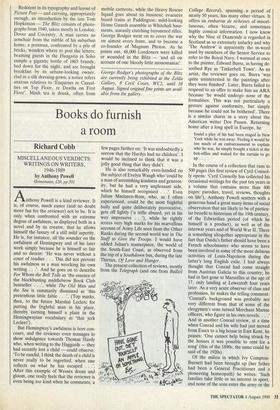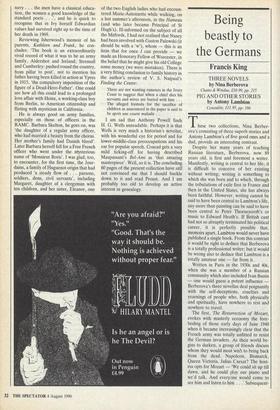Books do furnish a room
Richard Cobb
MISCELLANEOUS VERDICTS: WRITINGS ON WRITERS, 1946-1989 by Anthony Powell
Heinemann, £20, pp.501
Anthony Powell is a kind reviewer. It is, of course, much easier (and no doubt more fun for the reviewer) not to be. It is only when confronted with an extreme degree of awfulness, as displayed both in a novel and by its creator, that he allows himself the luxury of a still mild asperity. He is, for instance, all the sounder on the awfulness of Hemingway and of his later work simply because he is himself so fair and so decent: 'He was never without a court of toadies . . . This did not prevent his awfulness as a man wrecking his own writing . . .'. And he goes on to describe For Whom the Bell Tolls as 'the essence of the blockbusting middlebrow Book Club bestseller . . .', while The Old Man and the Sea is summarily dismissed as 'this pretentious little fable . . .'. (Top marks, then, to the future Marshal Leclerc for putting the frightful man in his place, thereby earning himself a place in the Hemingwayian vocabulary as 'that jerk Leclerc').
But Hemingway's awfulness is hors con- cours , and the reviewer even manages to show indulgence towards Thomas Hardy who, when writing to the Haggards — they had recently lost a child — could observe: `To be candid, I think the death of a child is never really to be regretted, when one reflects on what he has escaped . . .'. After this example of Wessex doom and gloom, one really feels that the reviewer is even being too kind when he comments, a few pages further on: 'It was undoubtedly a sorrow that the Hardys had no children'. I would be inclined to think that it was a jolly good thing that they didn't.
He is also remarkably even-handed on the subject of Evelyn Waugh who 'could be a man of astonishing kindness and generos- ity, but he had a very unpleasant side, which he himself recognised . . .'. Even Julian Maclaren-Ross, who, as I often experienced, could be the most frightful bully and quite deliberately provocative, gets off lightly ea trifle absurd, yet in his way impressive . . .'), while he rightly scores very high marks for his marvellous account of Army Life seen from the Other Ranks during the second world war in The Stuff to Give the Troops. I would have added Julian's masterpiece, the world of the South-East Coast, as observed from the top of a Southdown bus, during the late Thirties, Of Love and Hunger.
The present collection of reviews, mostly from the Telegraph (and one from Balliol College Record), spanning a period of nearly 50 years, has many other virtues. It offers an embarras de richesses of miscel- laneous, often bizarre, and sometimes highly comical information. I now know why the Nine of Diamonds is regarded in Scotland as so extremely unlucky and why 'The Andrew' is apparently the in-word used by members of the Senior Service to refer to the Royal Navy. I warmed at once to the painter, Edward Burra, as having de- scribed Rye as Tinkerbell Town'. As an artist, the reviewer goes on, Burra 'was quite uninterested in the paintings after they were finished'. Later, Burra failed to respond to an offer to make him an ARA because 'he would undergo none of the formalities. This was not particularly a gesture against conformity, but simply because he could not be bothered'. There is a similar charm in a story about the American writer Dos Passos. Returning home after a long spell in Europe, he
found a play of his had been staged in New York while he was away. Feeling it would be too much of an embarrassment to explain who he was, he simply bought a ticket at the box-office and waited for the curtain to go up. . .
In the course of a collection that runs to 500 pages (his first review of Cyril Connol- ly opens: 'Cyril Connolly has collected his occasional writings for the past ten years in a volume that contains more than 400 pages: parodies, travel, reviews, thoughts on life'), Anthony Powell scatters with a generous hand a great many items of social observation that are likely to be of particu- lar benefit to historians of the 19th century, of the Edwardian period (of which he himself is a product), as well as of the interwar years and of World War II. There is something altogether appropriate in the fact that Ouida's father should have been a French schoolmaster who seems to have been involved in some of the more dubious activities of Louis-Napoleon during the latter's long English exile. I had always thought that Conrad had come straight from Austrian Galicia to this country; he had in fact gone to Marseilles at the age of 17, only landing at Lowestoft four years later. As a very acute observer of class and profession, he makes the telling comment: 'Conrad's background was probably not very different from that of some of the clergymen's sons turned Merchant Marine officers, who figure in his own novels.. . And in another Conrad review, at a time when Conrad and his wife had just moved from Essex to a big house in East Kent, he pauses: 'One cannot help being struck by the houses it was possible to rent for a song' (this of the 1890s; the same could be said of the 1920s).
Of the milieu in which Ivy Compton- Burnett had been brought up (her father had been a General Practitioner and a pioneering homeopath) he writes: 'Such families take little or no interest in sport, and none of the sons enter the army or the navy . . . the men have a classical educa- tion, the women a good knowledge of the standard poets . . .', and he is quick to recognise that in Ivy herself Edwardian values had survived right up to the time of her death in 1969.
Reviewing Isherwood's Memoir of his parents, Kathleen and Frank, he con- cludes: 'The book is an extraordinarily vivid record of what it was to be an army family, Aldershot and Ireland; Strensall and Camberley: pushed round the country, from pillar to post', not to mention his father having been killed in action at Ypres in 1915, 'the compulsory imposition of the figure of a Dead-Hero-Father'. One could see how all this could lead to a prolonged love affair with Heinz, a working-class boy from Berlin, to American citizenship and flirting with mysticism in California.
He is always good on army families, especially on those of officers in the RAMC. Barbara Skelton, he goes on, was 'the daughter of a regular army officer, who had married a beauty from the chorus. Her mother's family had Danish blood'. Later Barbara herself fell for a Free French officer who went under the mysterious name of 'Monsieur Boris'. I was glad, too, to encounter, for the first time, the Jour- damns, a family of Huguenot origin that had produced 'a steady flow of . . . parsons, soldiers, dons, civil servants', including Margaret, daughter of a clergyman with ten children, and her sister, Eleanor, one
of the two English ladies who had encoun- tered Marie-Antoinette while walking, on a hot summer's afternoon, in the Hameau (and who later became Principal of St Hugh's). Ill-informed on the subject of all the Mitfords, I had not realised that Nancy had been involved with Gaston Palewski (it should be with a 'w'), whom — this is an item that for once / can provide — we made an Honorary Fellow of Worcester, in the belief that he might give his old College some money (we were mistaken). There is a very fitting conclusion to family history in the author's review of V. S. Naipaul's Finding the Centre: There are not wanting rumours in the Ivory Coast to suggest that when a chief dies his servants and wives are buried with him . . . The alleged formula for the sacrifice of children as announced in the paper is said to be apres une courte maladie . . .
I am sad that Anthony Powell finds H. G. Wells unreadable. Perhaps it is that Wells is very much a historian's novelist, with his wonderful eye for period and for lower-middle-class preoccupations and his ear for popular speech. Conrad gets a very mild ticking-off for having described Maupassant's Bel-Ami as 'that amazing masterpiece'. Well, so it is. The concluding 60 pages of the present collection have still not convinced me that I should buckle down to it and read Proust. And I am probably too old to develop an active interest in genealogy.

















































 Previous page
Previous page